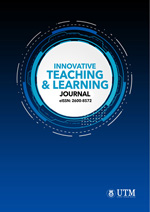Perception of Generative Artificial Intelligence in Higher Education Research
DOI:
https://doi.org/10.11113/itlj.v7.137Keywords:
Generative Artificial Intelligence, Higher education, Researchers' perceptions, Technology Acceptance Model (TAM), ChallengesAbstract
Integrating Generative Artificial Intelligence (AI) into higher education research holds great promise, but understanding researchers' perceptions and addressing associated challenges is crucial for success. This study investigates how researchers perceive the potential benefits of Generative AI, its ease of use, and the challenges affecting its adoption in higher education research. It aims to uncover diverse perspectives and insights for effective integration. Using a qualitative case study approach, data was collected from 33 researchers in social sciences at one institution through online surveys and interviews. Thematic analysis, guided by the Technology Acceptance Model (TAM), identified recurring themes. The findings reveal significant engagement with AI adoption, with most participants integrating Generative AI into their research. However, readiness to adopt varied, reflecting different levels of enthusiasm and preparedness. Participants' perceptions ranged from recognizing Generative AI's convenience to expressing concerns about potential negative impacts such as becoming overly reliant, aligning with TAM constructs. Additionally, participants stressed the importance of responsible and ethical Generative AI usage through training and awareness initiatives. These findings lay the foundation for strategies promoting Generative AI adoption and responsible integration in higher education research. Implications for institutions aiming to integrate Generative AI effectively emphasize the need to understand researchers' perspectives and address their concerns.

















